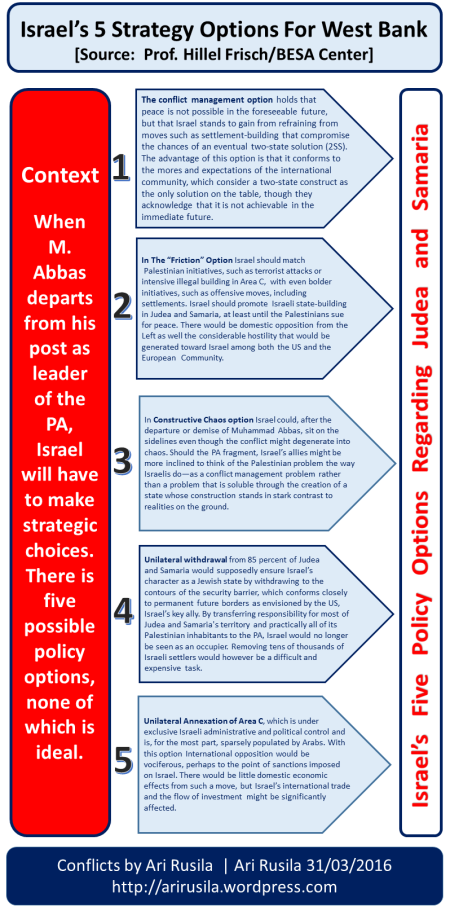“Under certain circumstances, I think Israel has the right to retain some, but unlikely all, of the West Bank.” (US ambassador to Israel, David Friedman)

No separation = One-State solution
Ever since the Six Day War in June 1967, innumerable plans have been put forward from the Left, the Right and the Center about what to do with the historic land – and its inhabitants – that suddenly and quite unexpectedly fell under Israel’s control – plans regarding ways to divide sc West Bank up or annex it or part of it to Israel, without imperiling the country’s Jewish majority.
From my viewpoint in Israel’s political sphere there is two main lines to approach this dilemma: Right-wing plans for annexation and left-wing plans for separation. In addition there is the maximalist alternative plans from the Right – annex all of the territories Israel gained during the Six Day War – and also the maximalist plans of the Left: a complete withdrawal from all the territories. Few Israelis, nor I, advocate such a policy, so over the years there have been numerous variations on this theme.
Sure there is also a zero-alternative, to do nothing else than keep “status quo”. This alternative, however, is leading towards undemocratic “One-state” solution, which in my opinion is one of the worst scenarios.
According Fathom approximately 590,000 Jews living beyond the Green Line can be divided into three groups. The first group is the approximate 200,000 Israelis who live in the 12 Jewish neighbourhoods of East Jerusalem, which will undoubtedly remain under Israeli sovereignty in any agreement. The second group is some 300,000 settlers who live in the so called ‘settlement blocs,’ located west of the security barrier which are usually very close to the Green Line. The vast majority of these settlements are also likely to remain under Israeli sovereignty. Only the third group, comprising 90,000 settlers – less than 20 per cent of the entire population of those living beyond the Green Line – who live beyond the route of the security barrier, needs to be addressed at the present time.
Right-wing plans: Annexation
During last years especially right-wing circles have promote partial annexation schemes – in the territorial, functional, and personal realms – within Area C. These alternatives include confining the annexation to settlement blocs, extending sovereignty to the territory of Israeli settlements, or applying Israeli legislation to Israeli residents of the West Bank. At least 60 pieces of legislation were drafted by right-wing members of the Knesset during the last parliament to move Israel from a state of de facto to de jure annexation, according to a database by Yesh Din, an Israeli human rights group. eight have passed into law.
The alternative plans from the Right range from extending Israeli sovereignty over all of Judea and Samaria and encouraging the Palestinians there to leave, to annexing Area C, and giving the 80,000 Palestinians living there Israeli citizenship.
On the far Right of the spectrum there is e.g. a plan articulated by former Likud MK Moshe Feiglin , who advocates a plan for Jewish sovereignty over Judea and Samaria while the Arab population would either emigrate voluntarily with the aid of a “generous emigration grant” or receive permanent residency – similar to Green Card status in the US – but be unable to vote.
Left-wing plans: Separation
“Fence is not a political border, it is not a security border, but rather another means to assist in the war on terror.”(Israeli PM Ariel Sharon)
Former Leader of the Israeli opposition – and Labor/Zionist Union – Isaac Herzog proposed to divide the land between the Israelis and Palestinians. Following a quote from interview of Isaac Herzog inFathom:
I speak in a very frank and open manner. I believe that Israel must move for peace. We must move towards the division of the land between the Palestinians and us in order to maintain the future of Israel as a Jewish democratic state. We will be here and you, Palestinians, will be there…Live your lives, improve your economy, create employment. The blocs under Israeli sovereignty will be part of the permanent solution. They will serve as recipients of settlers from outside the major blocs.”
Politically, the idea “us here, them there” harkens back to Yitzhak Rabin, who used that as a campaign slogan in 1992. Later former Prime Minister Ehud Olmert proposed a similar unilateral separation in the West Bank. Herzog’s plan seems likely to garner support among the centrist, center-left and even parts of the center-right Israeli voter base.
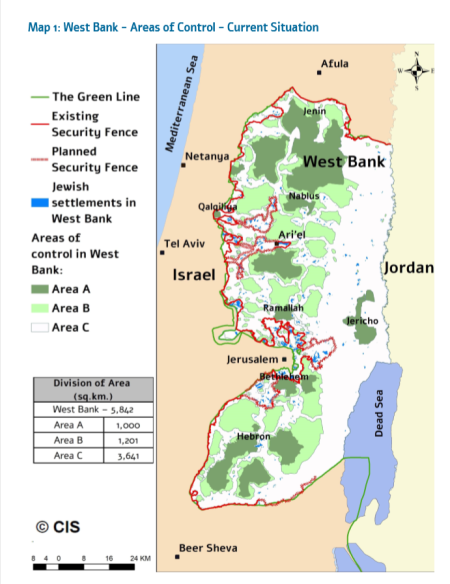
A key factor in determining the West Bank sc Separation Barrier’s (security fence)route was the location of settlements, thereby laying the groundwork for the de facto annexation of 81 settlements (including the 11 neighborhoods built in East Jerusalem). As of September 2017 some 460 kilometers (about 65% of the planned barrier) had been completed. Another 53 kilometers (about 7.5%) were under construction, and construction had yet to begin on some 200 kilometers.
The security fence/separation barrier is the largest infrastructure project in Israel’s history. Each kilometer of fence costs approximately $2 million.

Domino Effect: The worst scenario by Commanders for Israel’s Security (CIS)
Commanders for Israel’s Security (CIS) is a non-partisan movement. Its members are retired generals and equivalents in Israel’s security services (the IDF, the Shin Bet, Mossad and Israel Police). In October 2018 the group published a study Ramifications of West Bank Annexation which describes the worst scenario following possible West Bank, or part of it, annexation: The Domino Effect.
According study the annexation might lead to the collapse of the Palestinian Authority and the absence of an alternative government authority will force Israel to seize control of Areas A and B and to impose upon them a Military Administration regime. The annexation of the entire West Bank will constitute the irreversible abandonment of the trend toward separation and the de facto adoption of a one-state outcome.
Until a new security fence is constructed along the new borderline around the annexed territories entry from the Military Administration areas into Israel will be easy. This carries the risk of a drastic rise in security threats. Also according CIS to create a physical barrier between the annexed area and the remainder of the West Bank will require the relocation of the existing Security Fence to a new line, over twice as long (1,787 km compared to approximately 766 km planned of the Security Fence).
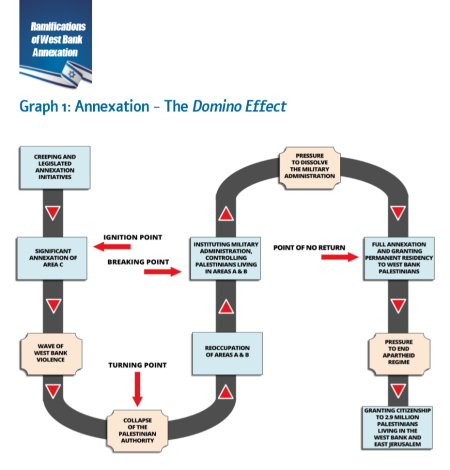
A new analysis
Recently, in the midst of the last election campaign (April 2019), a group of retired senior security officials in the defense establishment was telling voters that the elections would spell the difference between separation and annexation. The Commanders for Israel’s Security movement appealed to PM Netanyahu with warning that annexation of parts of the West Bank would endanger the residents of Israel. “The application of Israeli law to all or part of Judea and Samaria – not in the framework of a political settlement – will lead to a chain reaction that will seriously harm the security of the state, its economy and its regional and international standing. We want to warn in advance that what will begin with the application of sovereignty over a limited area will inevitably deteriorate to the total annexation of Judea and Samaria, to the millions of Palestinian residents. The decision of the Knesset to pass the legislation of annexation, however partial, can only be interpreted by the Palestinian Authority and the countries of the region and the world as a slamming of a door to a future political settlement,” the officials wrote.
A new analysis – The West Bank’s Area C: Israel’s Eastern Line of Defense – by Maj. Gen. (res.) Gershon Hacohen explores the strategic-military implications of the establishment of a Palestinian state along the pre-June 1967 lines. Its central thesis is ”that the creation of such a state, on the heels of the IDF’s total withdrawal from the West Bank, will not only deprive Israel of defensible borders but will almost certainly lead to the advent of a terrorist entity like the one created in the Gaza Strip – at a stone’s throw from the Israeli hinterland.”
According Gershon Hacohen, Israeli proponents of the IDF’s withdrawal from the West Bank, including most retired IDF/security establishment senior officials, base their strategic-military argumentation on four axiomatic assumptions:
IDF/CIS: Territorial separation between Israelis and Palestinians, including massive evacuation of Jewish West Bank neighborhoods, will delineate borders, reduce friction, and create stability.
In his study Hacohen rejects this strategic-military reasoning altogether claiming that withdrawal from the West Bank and the Jordan Valley and the establishment of a Palestinian state in these territories will confront Israel with an unprecedented security threat:
Massive evacuation of West Bank Jewish neighborhoods will not ameliorate the conflict, as argued by proponents of the twostate solution. Quite the reverse, in fact. The removal of the well-integrated Jewish neighborhoods from the West Bank will force all counterterrorist activities to be launched from inside Israel into the Palestinian population centers, where they will be met with tough resistance, which – as taught by the Gaza experience – necessitates the employment of massive military force.
 IDF/CIS: If the security situation becomes completely untenable, the Israeli government will not hesitate to decide to embark on any necessary military operation. Should stability deteriorate to the point of an unbearable threat, the IDF will be able to remove this security threat within days.
IDF/CIS: If the security situation becomes completely untenable, the Israeli government will not hesitate to decide to embark on any necessary military operation. Should stability deteriorate to the point of an unbearable threat, the IDF will be able to remove this security threat within days.
Hacohen opposes:
The claim that the IDF will be able to remove the threat of a fullfledged West Bank terrorist entity within days, along the lines of the astounding June 1967 victory, cannot be further removed from reality, even if Israel is not forced to fight on several fronts simultaneously. Suffice it to say that the operational difficulties faced by the Western armies in Afghanistan, Iraq, and Syria, especially in densely populated, built-up areas like Mosul and Aleppo, illustrate the callousness of ignoring the existential security-strategic threat attending total West Bank withdrawal and the establishment of a Palestinian state in this area.
IDF/CIS: Israel’s withdrawal from the West Bank and the end of the “occupation” will give any such military operation broad international backing.
Hacohen opposes:
Judging by the experience of the three Hamas-Israel wars (2008-9, 2012, and 2014), not only would the West Bank’s recapture not receive international legitimacy but Israel would face heavy international pressure to immediately withdraw its forces. The recapture of the West Bank would constitute the conquest of a sovereign state.
Democratic or Jewish state?
According Hacohen proponents of the two-state solution predicate their position on two parallel sets of arguments: political-ideological and strategic-military. On the first level, they claim that Israel’s continued control of the West Bank erodes its democratic nature, while solving this problem by annexing the territory and making its Palestinian residents Israeli citizens will spell the end of Israel as a Jewish state.
In my opinion this approach is totally correct as also I think that the core problem is whether Israel is a democratic state including its Palestinian residents from disputed territories or a Jewish State separating Israeli citizens from most part of Palestinian residents in West Bank; Israel can be democratic only if all its citizens have equal human and political rights.
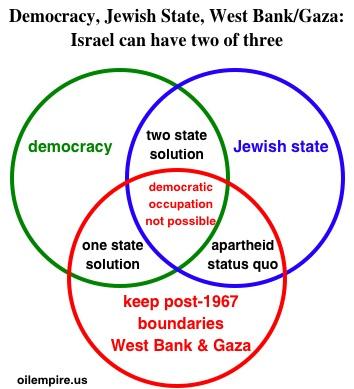
Security?
In his study Hacohen rejects this strategic-military reasoning altogether claiming that withdrawal from the West Bank and the Jordan Valley and the establishment of a Palestinian state in these territories will confront Israel with an unprecedented security threat; his claim is based on following arguments:
• Hezbollah’s operational doctrine – embraced by Hamas with necessary adaptations to the Gaza context, which will almost certainly be adopted in the West Bank after the Israeli withdrawal – foreshadows a lethal security threat from a Palestinian state in the mountainous terrain overlooking Israel’s narrow coastal plain, with its multiple strategic assets.
• This security threat will increase considerably in the event of a parallel conflagration in Gaza, Lebanon, and possibly Syria. The addition of a West Bank state to the equation is liable to place the IDF in a dire predicament – not only in terms of resource scarcity (manpower, ammunition, intelligence gathering capabilities, etc.) but also because of the operational-strategic constraints on its ability to launch a decisive offensive in the West Bank.
• The demilitarization of the future Palestinian state – a precondition for its establishment in the perception of those favoring this option – is a pipedream, as evidenced by the resounding failure to demilitarize the Gaza Strip despite the PLO’s commitment to this step in a number of signed agreements.
• The absence of an Israeli presence along the Jordan Valley will create a land continuum between the Palestinian state and the Arab world east of the Jordan River thus making it exceedingly difficult to prevent the arming of the (supposedly demilitarized) new state.
The main weakness, in my opinion, is that Hacohen’s study focuses exclusively on the strategic-military implications of the attempts at conflict resolution rather than their political-ideological dimensions.In the words of Maj. Gen. (res.) Amram Mitzna: “In the age of long-range missiles there is no importance for strategic depth. Agreements will provide us with greater security than strategic depth.” I also agree with IDF Chief-of-Staff Lt. Gen. (res.) Dan Halutz, who said (in Yediot Ahronot, Jan. 16, 2015) that “The IDF will be able to defend every line defined by the political leadership. It is worth noting that the greatest military victory (after the War of Independence) was won in 1967 from within the border that the current leadership describes as indefensible.”
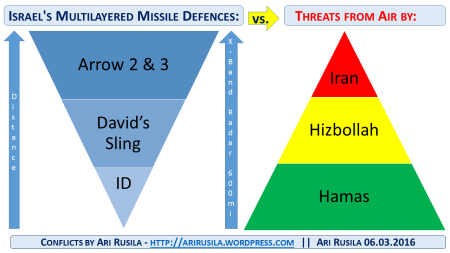
New threads and defence?
Sure also Hacohen is right saying that circumstances now are different than -67, e.g. urbanisation of the fighting space means that military planners have to incorporate the needs of the civilian population into their operational planning while being fully attentive to humanitarian, political, legal, ethical, and media considerations, among others.
In my opinion IDF is well prepared both at technical level as well in its strategy for new circumstances, threads and challenges. In the words of Chief-of-Staff Gadi Eizenkot’s August 2015 doctrinal pamphlet The IDF’s Strategy: “The IDF’s main approach to achieving a decision is the creative approach, based on focused offensive elements that target the enemy’s weak points while exploiting relative advantages, notably momentum, pace of action and initiative, whose integration achieves shock and surprise.”
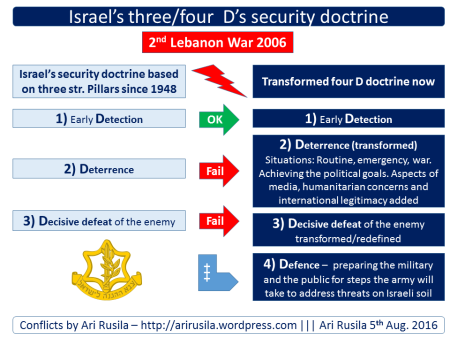
From my point of view Israel’s borders are defensible even if Israel annexes only 5-15% of West Bank and after Security Barrier has completed. I base this claim e.g. with following aspects:
- Israel has military and intelligence edge and I don’t have any doubts that it can keep this edge also in future,
- IDF, Mossad, Shin Bet etc can copy fast and flexible way to any new threads and challenges be they kite balloon or cyber attacks e.g. due first class ecosystem supporting new innovations,
- IDF is developing whole time both technic and strategic levels and probably it will have also enough financial resources to be updated based to its popular support in Israeli society; IDF is one of the most respected organisations in Israel.
If aspects mentioned above are valid it makes possible political decisions – negotiated or unilateral – like separation and relocating outposts.
 The fact is that separation e.g. with security barrier seems to be effective : Since construction of the fence began, the number of attacks has declined by more than 90%. The number of Israelis murdered and wounded decreased by more than 70% and 85%, respectively, following the erection of the fence. Israeli officials (including the head of the Shin Bet) have said that in the areas where the barrier was complete, the number of hostile infiltrations has decreased to almost zero as the barrier made it much harder to conduct attacks inside Israel.
The fact is that separation e.g. with security barrier seems to be effective : Since construction of the fence began, the number of attacks has declined by more than 90%. The number of Israelis murdered and wounded decreased by more than 70% and 85%, respectively, following the erection of the fence. Israeli officials (including the head of the Shin Bet) have said that in the areas where the barrier was complete, the number of hostile infiltrations has decreased to almost zero as the barrier made it much harder to conduct attacks inside Israel.
Sure the security/separation barrier limits the ability of the resistance to arrive deep within Israeli territory to carry out suicide bombing attacks, but same time terrorist organizations are looking for other ways to attack. One should also note that attacks have decreased due to increased pursuing of Palestinian militants by the Israeli army and intelligence organizations.

Haaretz Poll, May 2019
In my article Constructive Unilateralism: Leftist Approach to Israel-Palestine Conflict ‘ have referred some of new leftist initiatives which in my opinion are steps forward and also to the right direction as well including required new roadmap for better future. I don’t see constructive unilateral steps as goal but more as strategy and process which will lead towards a comprehensive agreement. It also might be that what’s left of the West Bank will become cantons or autonomy under Jordan’s administrative rule or (confederation).
My view
Partial (right-wing) annexation schemes may be a step away from separation and toward One-State reality – to a single binational state. Partial unilateral annexations might indeed lead to the termination of security coordination by the Palestinian Authority (PA) or its collapse. Israel would be forced to respond to the security and civil affairs vacuum created and the accompanying side-effects, including a potential wave of violence. In such a scenario, Israel will need to seize control of the entire West Bank. In my opinion this scenario will either end Israel as Jewish state or democratic state.
In my opinion the best solution for Israel-Palestine conflict is the Three-State solution where Gaza will be annexed to Egypt (Sinai option) and most part (80-90%) of West Bank will be annexed to Jordan (Jordan option). This solution however does not have wider support in Jordan nor among international community. Instead the Two-State solution has wide regional and international support but the road map to achieve this outcome has been dead for decades. From my point of view the core challenges in Israel-Palestine conflict are:
- how some long term solution could be achieved with a minimal evacuation of Jews from the West Bank,
- how to make, from Israeli side, constructive unilateral actions without endangering cooperation with Palestinian Authority,
- how to keep door open for viable Palestinian state in future
Implementing Two-State based to separation is not new idea in Israel’s political (centre)left. Indeed Prime Minister Ehud Barak agreed (at the July 2000 Camp David summit and the January 2001 Taba summit) to the establishment of a Palestinian state in the entire Gaza Strip and 95% of the West Bank, which would also control the Jordan Valley. Similarly sweeping concessions were also made by Prime Minister Ehud Olmert in the November 2007 Annapolis conference.
 I didn’t mention Gaza as in my opinion there is already realistic plans for viable Palestinian state or autonomy for Gaza including reconstruction and investment plans, extra land (Sinai Option), border posts and international port etc. First steps to implement these plans have been long-term ceasefire (hudna) between Israel and Hamas and there is already earmarked donations reserved to implement this plan in Arabic states, US, Israel and wider international community.
I didn’t mention Gaza as in my opinion there is already realistic plans for viable Palestinian state or autonomy for Gaza including reconstruction and investment plans, extra land (Sinai Option), border posts and international port etc. First steps to implement these plans have been long-term ceasefire (hudna) between Israel and Hamas and there is already earmarked donations reserved to implement this plan in Arabic states, US, Israel and wider international community.
As preliminary part of coming Trump’s peace deal the same idea like for Gaza – from economic peace to political peace – is possible also in West Bank. In June/July 2019 will be held sc “Peace to Prosperity” workshop in Bahrain and it is a pivotal opportunity… to share ideas, discuss strategies and galvanize support for potential economic investments and initiatives that could be made possible by a peace agreement. Jordan, Egypt and other Arab countries as well Israeli business men will attend to workshop; however, Palestinian officials have confirmed they will not be in attendance.
Related articles:
New Road Maps to the Two-State
Israeli-Palestinian Conflict: A Revised Hybrid Model as Solution
Constructive Unilateralism (II) as Solution to Israeli-Palestinian Conflict
Herzog’s Plan: Security Barrier Around the Major Settlement Blocs of West Bank
Analysis: Resolving The Israeli-Palestinian Conflict
